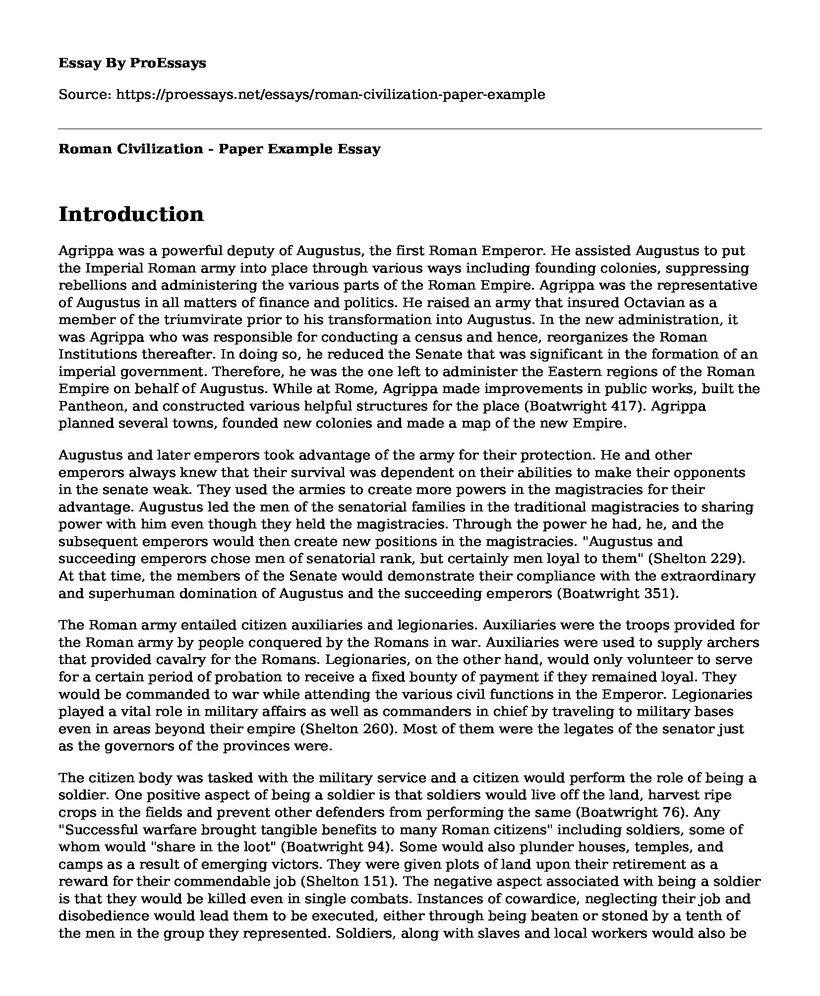Introduction
Agrippa was a powerful deputy of Augustus, the first Roman Emperor. He assisted Augustus to put the Imperial Roman army into place through various ways including founding colonies, suppressing rebellions and administering the various parts of the Roman Empire. Agrippa was the representative of Augustus in all matters of finance and politics. He raised an army that insured Octavian as a member of the triumvirate prior to his transformation into Augustus. In the new administration, it was Agrippa who was responsible for conducting a census and hence, reorganizes the Roman Institutions thereafter. In doing so, he reduced the Senate that was significant in the formation of an imperial government. Therefore, he was the one left to administer the Eastern regions of the Roman Empire on behalf of Augustus. While at Rome, Agrippa made improvements in public works, built the Pantheon, and constructed various helpful structures for the place (Boatwright 417). Agrippa planned several towns, founded new colonies and made a map of the new Empire.
Augustus and later emperors took advantage of the army for their protection. He and other emperors always knew that their survival was dependent on their abilities to make their opponents in the senate weak. They used the armies to create more powers in the magistracies for their advantage. Augustus led the men of the senatorial families in the traditional magistracies to sharing power with him even though they held the magistracies. Through the power he had, he, and the subsequent emperors would then create new positions in the magistracies. "Augustus and succeeding emperors chose men of senatorial rank, but certainly men loyal to them" (Shelton 229). At that time, the members of the Senate would demonstrate their compliance with the extraordinary and superhuman domination of Augustus and the succeeding emperors (Boatwright 351).
The Roman army entailed citizen auxiliaries and legionaries. Auxiliaries were the troops provided for the Roman army by people conquered by the Romans in war. Auxiliaries were used to supply archers that provided cavalry for the Romans. Legionaries, on the other hand, would only volunteer to serve for a certain period of probation to receive a fixed bounty of payment if they remained loyal. They would be commanded to war while attending the various civil functions in the Emperor. Legionaries played a vital role in military affairs as well as commanders in chief by traveling to military bases even in areas beyond their empire (Shelton 260). Most of them were the legates of the senator just as the governors of the provinces were.
The citizen body was tasked with the military service and a citizen would perform the role of being a soldier. One positive aspect of being a soldier is that soldiers would live off the land, harvest ripe crops in the fields and prevent other defenders from performing the same (Boatwright 76). Any "Successful warfare brought tangible benefits to many Roman citizens" including soldiers, some of whom would "share in the loot" (Boatwright 94). Some would also plunder houses, temples, and camps as a result of emerging victors. They were given plots of land upon their retirement as a reward for their commendable job (Shelton 151). The negative aspect associated with being a soldier is that they would be killed even in single combats. Instances of cowardice, neglecting their job and disobedience would lead them to be executed, either through being beaten or stoned by a tenth of the men in the group they represented. Soldiers, along with slaves and local workers would also be involved in heavy construction works such as the erection of roads (Shelton 89).
Augustus and other emperors knew that there were positions with more prestige than their positions. These positions included the consulship, praetorship, aedileship, and quaestorship. The army would help them reinforce administration of justice in the city. The leaders would use public funds dedicated to the soldiers and the entire army to arrange for events while in power. Through staging various events, they would gain political popularity even though people would think that the army was being used to stage a coup (Shelton 331). The armies would let the Emperors stage lavish entertainments. This affected them in that they became more concerned with the administration of justice in the city rather than being concerned with military leadership.
Conclusion
The republican and imperial periods differed in various dimensions and various changes were associated with each of them. The imperial period saw Augustus into creating a strong, loyal, experienced imperial civil service. Imperial soldiers usually spent most of their time in one job and learned it well as compared to the previous time. The Imperial soldiers developed good working relationships with other workers. Most of them would find opportunities to realize their talents and would be promoted to another level. Earlier, men would begin as military officers and later move into civil administration positions. Imperial soldiers would just get into a single career. The entire army would be "occupied primarily with defending the borders of the far-flung Empire" in the Imperial period (Shelton 243).
References
Boatwright, Mary Taliaferro., et al. The Romans: From Village to Empire. Oxford University Press, 2004.Shelton, Jo-Ann. As the Romans Did: a Sourcebook in Roman Social History. Oxford University Press., 1998.
Cite this page
Roman Civilization - Paper Example. (2022, May 09). Retrieved from https://proessays.net/essays/roman-civilization-paper-example
If you are the original author of this essay and no longer wish to have it published on the ProEssays website, please click below to request its removal:
- Paper Example on Roanoke Island Freedmen's Colony
- Variations in Low Classes in Women and Demography Among Local Populations in African-Americans
- Madam C.J. Walker Biography
- Essay on Theodore Roosevelt's Strenuous Life Speech: A Motivational Contribution to American History
- Religion's Impact: From Abolition of Slavery to Abortion Debate - Research Paper
- Essay Example on Racial and Nationalism in WW1: A Historical Analysis
- Gnosticism: A Unique Perspective in Ancient Greek Religion - Essay Sample







